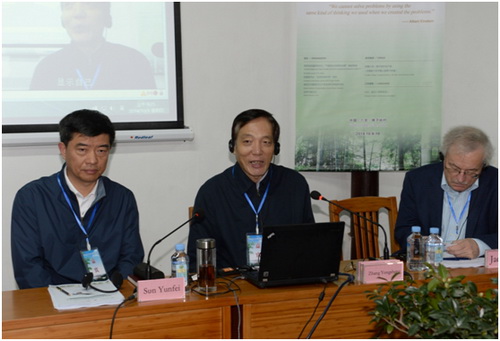LuAn Declaration released at the Transcontinental Video Conference on Green Growth in a poor Chinese farmer's house
Oct 20,2014
The vice minister Shijin Liu participated in and chaired the LuAn conference. The experts from the World Bank, OECD, Global Climate Forum, the Free University (FU) of Berlin, German BMZ, Energy Foundation China, Global Green Growth Institute, the UK Department for International Development, and Counsellor Office of the State Council, Ministry of Culture, Ministry of Environment Protection, Peking University, Tsinghua University, Renmin University of China, Development Research Center of the State Council, and local officials in LuAn, had in-depth discussions and dialogues, with live-streamed video link to Brussels and Phoenix venues, and released the LuAn Declaration on Green Development in Poor Regions.
According to the LuAn Declaration, Human society is transitioning from the Industrial Era to the Internet Era. This transition is dramatically impacting the traditional development paradigm, and makes it possible for the poor regions to leapfrog to an Internet-based new green economy of the future. The value of rural areas, as well as the opportunities that green growth represents, can only be fully recognized if we jump out of the box of traditional industrialization thinking. Going beyond traditional industrialization thinking and development rationale to embrace green development in the era of the Internet, rural villages in China are witnessing a new era!
 |
|
From the left: Mr. Yunfei Sun, the CCP Chief in LuAN, Vice President/Professor Dr. Shijin Liu of the Development Research Center of the State Council, PRC. Professor Dr. Martin Jaenicke at the Free University (FU) of Berlin. |
 |
|
Live-streamed Video link between LuAn venue and Brussels venue |
This conference is part of the experiments the DRC/CCGG team conducts to help LuAn to promote green growth. The location of this conference in a typical Anhui farmer's house with over one hundred years history is to send two key messages. First, in the era of the Internet and high-speed transport, the traditional constraints against development in poor regions, including geographic isolation, are largely being overcome. Second, the intangible green resources that were ignored in the traditional development model, such as ecosystem assets, local culture, etc., are invaluable assets for their development. These intangible 'new' green resources can be turned into 'gold'.
By fully exploiting the advantages of the Internet, e-commerce, rapid transport and logistics, such poor regions can rapidly integrate into the advanced external market, and by using new business models in the Internet Era, they can turn their 'new' green resources such as ecosystem assets and intangible local culture into 'gold', and thus leapfrog into the economy of the future.
This conference itself is a test of the vision. If we are able to hold such a trans-continental live-streamed conference through ICT in a geographically isolated poor village, then it shows that various green businesses and services can be developed in similarly poor regions, including MOOCs, on-line healthcare, e-commerce, conferences, training, digital agriculture, recreation, culture, arts, sports, eco-tourism etc. Poor regions then have no need to follow the traditional pathway to growth, but can leapfrog to an Internet-based new green economy. The success of such a green growth experiment in poor regions in China would have significant implications for the rest of the world.














